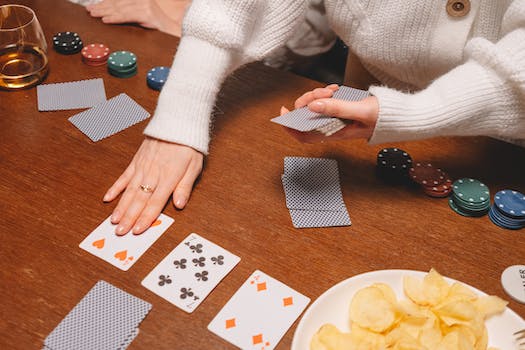Dealing with confidence is a crucial aspect of the game of poker. Proper card distribution plays a significant role in determining the outcome of each hand. Understanding the secrets behind effective card distribution can give players an edge in the game, allowing them to make informed decisions and increase their chances of winning. In this article, we will explore the importance of confidence in dealing cards and delve into the strategies and techniques that can help unlock the secrets to proper card distribution in the game of poker.
The Importance of Confidence in Poker: How it Affects Card Distribution
In poker, card distribution refers to the process of dealing cards to players. The way cards are distributed can have a significant impact on the outcome of the game. It is not just a matter of randomly shuffling and dealing cards; it requires a certain level of skill and finesse. This is where confidence comes into play.
Confidence in poker is not just about having a positive mindset or believing in your abilities. It is about having the knowledge and understanding of how to distribute cards effectively. When a player lacks confidence, it can lead to mistakes in card distribution, which can ultimately affect the outcome of the game.
One of the ways confidence affects card distribution is through the speed and accuracy of dealing. A confident dealer will be able to swiftly and accurately distribute cards to players, ensuring that each player receives their cards in a fair and unbiased manner. On the other hand, a player lacking confidence may hesitate or fumble while dealing, leading to delays and potential errors in card distribution.
Confidence also plays a role in the fairness of card distribution. In poker, it is essential that cards are distributed randomly and without any bias. A confident dealer will be able to ensure that the cards are shuffled thoroughly and distributed in a way that is fair to all players. They will not be influenced by personal biases or preferences, ensuring that each player has an equal chance of receiving a good hand.
Furthermore, confidence in card distribution can also affect the overall atmosphere at the poker table. A confident dealer will exude a sense of professionalism and competence, which can help create a positive and enjoyable playing environment. Players will feel more at ease knowing that the cards are being distributed by someone who knows what they are doing, enhancing the overall experience of the game.
So, how can one develop confidence in card distribution? Practice is key. By repeatedly practicing the process of shuffling and dealing cards, players can become more comfortable and confident in their abilities. They can also study and learn different techniques and strategies for card distribution, such as the riffle shuffle or the overhand shuffle, to further enhance their skills.
Additionally, observing experienced dealers and learning from their techniques can also help build confidence. Watching how they handle the cards, their speed, and accuracy can provide valuable insights that can be applied to one’s own card distribution.
In conclusion, confidence is a crucial factor in proper card distribution in the game of poker. It affects the speed, accuracy, fairness, and overall atmosphere at the poker table. By developing confidence through practice, observation, and learning, players can unlock the secrets to effective card distribution, ultimately improving their chances of success in the game. So, the next time you sit down at a poker table, remember the importance of confidence and how it can impact your card distribution.
Mastering the Art of Card Distribution: Strategies for Building Confidence in Poker
One key strategy for mastering the art of card distribution is to establish a consistent and efficient dealing routine. This not only ensures fairness in the game but also helps to build confidence in the dealer. By following a set routine, players can trust that the cards are being distributed in a random and unbiased manner, eliminating any doubts or suspicions.
Another important aspect of card distribution is the speed at which the cards are dealt. A slow and hesitant dealer can create a sense of unease among the players, leading to a loss of confidence in the fairness of the game. On the other hand, a fast and efficient dealer can instill a sense of trust and confidence in the players, allowing them to focus on their strategies and decisions.
In addition to the mechanics of card distribution, the physical presentation of the cards also plays a role in building confidence. A neat and organized deck, free from any marks or damage, gives the impression of a well-maintained game. On the other hand, a deck that is worn out or marked can raise suspicions and erode confidence in the fairness of the game. It is essential for dealers to regularly inspect and replace decks to ensure a professional and trustworthy playing environment.
Furthermore, the manner in which the cards are presented to the players can also impact their confidence. A dealer who consistently presents the cards face down, without revealing any information, creates an atmosphere of mystery and uncertainty. On the other hand, a dealer who confidently flips the cards face up, allowing players to see their hands clearly, instills a sense of transparency and fairness. This small gesture can make a significant difference in the players’ perception of the game.
Lastly, it is crucial for dealers to maintain a calm and composed demeanor throughout the card distribution process. Any signs of nervousness or hesitation can create doubt in the players’ minds, leading to a loss of confidence in the dealer’s abilities. By remaining confident and in control, dealers can inspire trust and create a positive playing environment.
In conclusion, mastering the art of card distribution is a crucial aspect of playing poker. By establishing a consistent and efficient dealing routine, maintaining a fast and confident pace, presenting the cards neatly and transparently, and projecting a calm and composed demeanor, dealers can build confidence in the fairness of the game. These strategies not only benefit the players but also contribute to a more enjoyable and competitive poker experience. So, the next time you sit down at the poker table, remember the secrets to proper card distribution and unlock your confidence in the game.
Psychological Factors in Card Distribution: Boosting Confidence for Better Poker Performance
When it comes to card distribution, there are several psychological factors that can influence a player’s confidence. One of the most important is the belief in one’s ability to control the outcome of the game. This belief, known as self-efficacy, can have a significant impact on a player’s confidence level. When players believe that they have control over the cards they are dealt, they are more likely to feel confident in their ability to make the right decisions and ultimately win the game.
Another psychological factor that can affect confidence in card distribution is the perception of fairness. Players who believe that the cards are being distributed fairly are more likely to feel confident in their ability to win. On the other hand, if players perceive the card distribution as unfair or biased, it can undermine their confidence and lead to poor decision-making.
One way to boost confidence in card distribution is through positive self-talk. By using positive affirmations and focusing on past successes, players can build their confidence and trust in their ability to receive favorable cards. For example, a player might remind themselves of a time when they received a winning hand and use that memory to reinforce their belief in their ability to receive good cards in the future.
Visualization is another powerful tool for boosting confidence in card distribution. By mentally rehearsing successful card distributions and envisioning oneself receiving favorable hands, players can create a sense of confidence and expectation for positive outcomes. This technique has been used by professional athletes for years and can be just as effective in the game of poker.
In addition to individual psychological factors, the social dynamics of the game can also impact a player’s confidence in card distribution. For example, if a player is playing against opponents who are known for their skill in card reading, it can create doubt and uncertainty in the player’s mind. This can lead to a lack of confidence in their ability to receive favorable cards and make the right decisions.
To counteract these social pressures, it is important for players to focus on their own game and not be overly influenced by the actions and behaviors of others. By staying true to their own strategies and trusting in their abilities, players can maintain their confidence in card distribution and make more informed decisions.
In conclusion, confidence is a crucial factor in the game of poker, particularly when it comes to card distribution. Understanding the psychological factors that influence confidence can help players unlock the secrets to proper card distribution and improve their overall performance. By believing in their ability to control the outcome of the game, perceiving fairness in card distribution, using positive self-talk and visualization techniques, and staying focused on their own game, players can boost their confidence and increase their chances of success at the poker table.
Overcoming Doubt and Building Confidence: Techniques for Effective Card Distribution in Poker
Confidence is key in any game of poker. When it comes to card distribution, having confidence in your abilities can make all the difference. Doubt can lead to mistakes and poor decision-making, which can ultimately cost you the game. So, how can you overcome doubt and build confidence in your card distribution skills?
First and foremost, practice makes perfect. The more you practice distributing cards, the more comfortable and confident you will become. Set up mock games with friends or family and focus on your card distribution technique. Pay attention to your hand movements, the speed at which you deal the cards, and the accuracy of your distribution. By practicing regularly, you will develop muscle memory and become more confident in your abilities.
Another technique to build confidence in card distribution is to study the game. Familiarize yourself with the rules and strategies of poker. Understand the different hand rankings and how they can affect the outcome of the game. By having a deep understanding of the game, you will feel more confident in your ability to distribute the cards effectively.
Transitional phrase: In addition to practice and knowledge, there are a few specific techniques that can help improve your card distribution skills.
One technique is to maintain a steady rhythm while dealing the cards. This not only adds a level of professionalism to your game but also helps to ensure fairness. By maintaining a consistent rhythm, you eliminate any suspicion of favoritism or cheating. It also helps to keep the game flowing smoothly, allowing players to focus on their strategies rather than being distracted by uneven or slow card distribution.
Another technique is to use a shuffle machine. While some may argue that using a shuffle machine takes away from the skill of card distribution, it can actually enhance the game. Shuffle machines ensure a fair and random distribution of cards, eliminating any bias or human error. By using a shuffle machine, you can focus on other aspects of the game, such as reading your opponents and making strategic decisions.
Transitional phrase: Finally, it is important to remember that confidence in card distribution is not just about technique, but also about mindset.
Having a positive mindset can greatly impact your card distribution skills. If you approach the game with a negative or doubtful mindset, it will reflect in your card distribution. On the other hand, if you approach the game with confidence and a positive attitude, it will translate into your card distribution. Believe in your abilities and trust that you are capable of distributing the cards effectively.
In conclusion, proper card distribution in the game of poker requires confidence and technique. By practicing regularly, studying the game, and using specific techniques such as maintaining a steady rhythm and using a shuffle machine, you can improve your card distribution skills. Additionally, having a positive mindset is crucial in building confidence and ensuring fair and effective card distribution. So, the next time you sit down at the poker table, remember to deal with confidence and unlock the secrets to proper card distribution.
Confidence and Card Distribution: Unveiling the Secrets to Success in the Game of Poker
When it comes to card distribution, there are a few key factors to consider. The first is the importance of randomness. In order for the game to be fair and unbiased, the cards must be distributed randomly. This means that each player has an equal chance of receiving any given card. Randomness ensures that no player has an advantage over another based solely on the cards they are dealt.
However, randomness alone is not enough. The skill of the dealer also comes into play. A skilled dealer knows how to distribute the cards in a way that is both fair and efficient. They must be able to shuffle the deck thoroughly to ensure randomness, and then distribute the cards quickly and accurately to each player. This requires practice and precision.
Confidence is another crucial element in card distribution. A confident dealer exudes professionalism and competence, which can help put players at ease. When players feel confident in the dealer’s abilities, they are more likely to trust the fairness of the game and focus on their own strategies. On the other hand, a hesitant or unsure dealer can create doubt and suspicion among the players, which can negatively impact the overall atmosphere of the game.
In addition to confidence, communication is key in card distribution. A dealer must be able to clearly communicate the rules and procedures of the game to the players. This includes explaining the betting structure, the order of play, and any special rules or variations. Clear communication helps ensure that all players are on the same page and reduces the likelihood of misunderstandings or disputes.
Furthermore, a skilled dealer knows how to read the players at the table. They can pick up on subtle cues and body language that may indicate a player’s confidence or lack thereof. This information can be used to their advantage in the distribution of cards. For example, if a player appears nervous or unsure, the dealer may choose to distribute the cards in a way that is less favorable to that player, giving themselves a slight advantage.
In conclusion, proper card distribution is a crucial aspect of the game of poker. It requires a combination of randomness, skill, confidence, and communication. A skilled dealer knows how to shuffle the deck thoroughly, distribute the cards quickly and accurately, and communicate the rules of the game effectively. Confidence plays a crucial role in this process, as it helps create a positive and trusting atmosphere among the players. By understanding and mastering the secrets of card distribution, players can greatly increase their chances of success in the game of poker. Proper card distribution in the game of poker is crucial for maintaining fairness and ensuring a balanced gameplay. It is important for dealers to follow established protocols and techniques to distribute cards effectively and avoid any biases or unfair advantages. By understanding the principles of card distribution and practicing proper techniques, players can enhance their confidence in the game and contribute to a more enjoyable and competitive poker experience.




